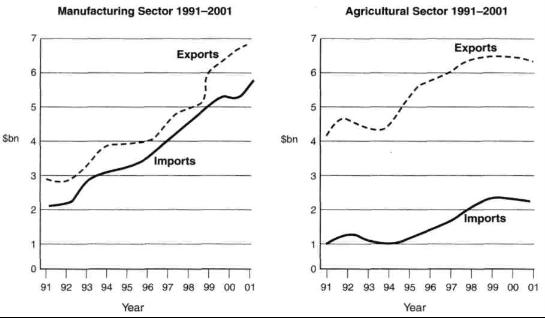 返回
教育头条
返回
教育头条

商务英语格陵兰岛的冰川即将消失文章分享
今天小编为大家分享的是商务英语格陵兰岛的冰川即将消失文章,希望通过这篇文章的学习对你们有所帮助,下面跟随小编一起学习吧。
Greenland Will Be Ice-free by the Year 3000 If We Don’t Reduce Emissions
Hannah Osborne
Scientists have warned that Greenland will be ice-free in the next thousand years unless greenhouse gas emissions are substantially reduced. Using three different climate change scenarios, a team of researchers ran hundreds of simulations to see how the ice would respond in the future.
Their findings showed that if we continue along our current trajectory of warming, 100 percent of Greenland’s present-day ice mass will be gone. This could raise sea levels by over seven meters (23 feet).
The Greenland Ice Sheet is a huge mass almost the size of Alaska – but it has started to disintegrate. Subsurface ocean temperatures along its west coast rose by 1.5 C between 1996 and 1998, causing the ice sheet to retreat and thin. Scientists are worried that warming could cause it to collapse – an event predicted to raise sea levels so much that it would submerge a number of major U.S. cities, including San Francisco, Los Angeles and New Orleans.
Scientists are working to understand how Greenland’s ice sheet will respond to future warming. The Intergovernmental Panel for Climate Change (IPCC) estimates that if global greenhouse gas emissions continue on their current trajectory, global temperatures will increase by between 2.6 and 4.8 C on pre-industrial levels. If emissions are reduced drastically, this can be reduced to between 0.3 and 1.7 C. A third scenario is emissions peaking at the middle of the century than drop rapidly – if this happens warming of between 1.1 and 2.6 degrees C.
Using these three climate change scenarios, a team of researchers led by Andy Aschwanden from the University of Alaska Fairbanks Geophysical Institute, developed a model for how Greenland will respond to warming and ran 500 computer simulations to show what could happen over the next 1,000 years. The model took into account atmospheric and ocean conditions as well as ice geometry, flow and thickness.
Their findings, published in Science Advances, showed that “in a thousand years, the Greenland Ice Sheet will look significantly different than today.” Under the best case scenario, Greenland will lose between eight and 25 percent of its present-day mass. Under moderate climate change it would lose between 26 and 57 percent, while under the worst case scenario, between 72 and 100 percent will disappear.

“We project that Greenland will very likely become ice-free within a millennium without substantial reductions in greenhouse gas emissions,” they conclude.
“We project that Greenland will very likely become ice-free within a millennium without substantial reductions in greenhouse gas emissions,” they conclude.
The study comes as researchers find the Canadian permafrost (ground that is permanently frozen) has started to thaw – 70 years earlier than predicted. “What we saw was amazing,” Vladimir E. Romanovsky, lead author of the study published in Geophysical Research Letters, told Reuters. “It’s an indication that the climate is now warmer than at any time in the last 5,000 or more years.”
Greenland Will Be Ice-free by the Year 3000 If We Don’t Reduce Emissions
Hannah Osborne
Scientists have warned that Greenland will be ice-free in the next thousand years unless greenhouse gas emissions are substantially reduced. Using three different climate change scenarios, a team of researchers ran hundreds of simulations to see how the ice would respond in the future.
Their findings showed that if we continue along our current trajectory of warming, 100 percent of Greenland’s present-day ice mass will be gone. This could raise sea levels by over seven meters (23 feet).
The Greenland Ice Sheet is a huge mass almost the size of Alaska – but it has started to disintegrate. Subsurface ocean temperatures along its west coast rose by 1.5 C between 1996 and 1998, causing the ice sheet to retreat and thin. Scientists are worried that warming could cause it to collapse – an event predicted to raise sea levels so much that it would submerge a number of major U.S. cities, including San Francisco, Los Angeles and New Orleans.
Scientists are working to understand how Greenland’s ice sheet will respond to future warming. The Intergovernmental Panel for Climate Change (IPCC) estimates that if global greenhouse gas emissions continue on their current trajectory, global temperatures will increase by between 2.6 and 4.8 C on pre-industrial levels. If emissions are reduced drastically, this can be reduced to between 0.3 and 1.7 C. A third scenario is emissions peaking at the middle of the century than drop rapidly – if this happens warming of between 1.1 and 2.6 degrees C.
Using these three climate change scenarios, a team of researchers led by Andy Aschwanden from the University of Alaska Fairbanks Geophysical Institute, developed a model for how Greenland will respond to warming and ran 500 computer simulations to show what could happen over the next 1,000 years. The model took into account atmospheric and ocean conditions as well as ice geometry, flow and thickness.
Their findings, published in Science Advances, showed that “in a thousand years, the Greenland Ice Sheet will look significantly different than today.” Under the best case scenario, Greenland will lose between eight and 25 percent of its present-day mass. Under moderate climate change it would lose between 26 and 57 percent, while under the worst case scenario, between 72 and 100 percent will disappear.

“We project that Greenland will very likely become ice-free within a millennium without substantial reductions in greenhouse gas emissions,” they conclude.
“We project that Greenland will very likely become ice-free within a millennium without substantial reductions in greenhouse gas emissions,” they conclude.
The study comes as researchers find the Canadian permafrost (ground that is permanently frozen) has started to thaw – 70 years earlier than predicted. “What we saw was amazing,” Vladimir E. Romanovsky, lead author of the study published in Geophysical Research Letters, told Reuters. “It’s an indication that the climate is now warmer than at any time in the last 5,000 or more years.”
好了,就说这么多,希望对大家有用。我是你的学习顾问王敏,选课有问题,快来找行家,我会为你匹配最适的课程,欢迎大家关注我微信(18560125702),学姐近10年教培行业工作经验,从现在开始我就是你的私人顾问,为您的课程进行一个详细系统的讲解哦。返回教育宝头条
【免责声明】本文仅代表作者本人观点,与教育宝无关。教育宝对文中陈述、观点判断保持中立,不对所包含内容的准确性、可靠性或完整性提供任何保证。请读者仅作参考,特此声明!





